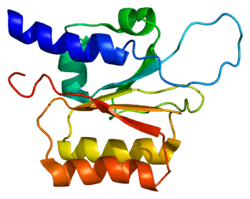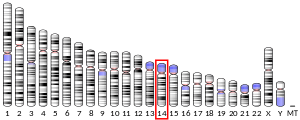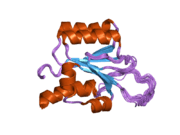SCFD1
Sec1 family domain-containing protein 1 is a protein that in humans is encoded by the SCFD1 gene.[5]
Interactions
SCFD1 has been shown to interact with USO1.[6][7]
gollark: Surewhynot.
gollark: Not enough dragons beginning with T.
gollark: I don't think we can do anything for thursdays.
gollark: Should we have a schedule of some sort then?
gollark: Trandomjunk Tuesdays!
References
- GRCh38: Ensembl release 89: ENSG00000092108 - Ensembl, May 2017
- GRCm38: Ensembl release 89: ENSMUSG00000020952 - Ensembl, May 2017
- "Human PubMed Reference:". National Center for Biotechnology Information, U.S. National Library of Medicine.
- "Mouse PubMed Reference:". National Center for Biotechnology Information, U.S. National Library of Medicine.
- "Entrez Gene: SCFD1 sec1 family domain containing 1".
- Shorter J, Beard MB, Seemann J, Dirac-Svejstrup AB, Warren G (April 2002). "Sequential tethering of Golgins and catalysis of SNAREpin assembly by the vesicle-tethering protein p115". J. Cell Biol. 157 (1): 45–62. doi:10.1083/jcb.200112127. PMC 2173270. PMID 11927603.
- Allan BB, Moyer BD, Balch WE (July 2000). "Rab1 recruitment of p115 into a cis-SNARE complex: programming budding COPII vesicles for fusion". Science. 289 (5478): 444–8. doi:10.1126/science.289.5478.444. PMID 10903204.
Further reading
- Rual JF, Venkatesan K, Hao T, Hirozane-Kishikawa T, Dricot A, Li N, Berriz GF, Gibbons FD, Dreze M, Ayivi-Guedehoussou N, Klitgord N, Simon C, Boxem M, Milstein S, Rosenberg J, Goldberg DS, Zhang LV, Wong SL, Franklin G, Li S, Albala JS, Lim J, Fraughton C, Llamosas E, Cevik S, Bex C, Lamesch P, Sikorski RS, Vandenhaute J, Zoghbi HY, Smolyar A, Bosak S, Sequerra R, Doucette-Stamm L, Cusick ME, Hill DE, Roth FP, Vidal M (2005). "Towards a proteome-scale map of the human protein-protein interaction network". Nature. 437 (7062): 1173–8. doi:10.1038/nature04209. PMID 16189514.
- Beausoleil SA, Jedrychowski M, Schwartz D, Elias JE, Villén J, Li J, Cohn MA, Cantley LC, Gygi SP (2004). "Large-scale characterization of HeLa cell nuclear phosphoproteins". Proc. Natl. Acad. Sci. U.S.A. 101 (33): 12130–5. doi:10.1073/pnas.0404720101. PMC 514446. PMID 15302935.
- Hirose H, Arasaki K, Dohmae N, Takio K, Hatsuzawa K, Nagahama M, Tani K, Yamamoto A, Tohyama M, Tagaya M (2004). "Implication of ZW10 in membrane trafficking between the endoplasmic reticulum and Golgi". EMBO J. 23 (6): 1267–78. doi:10.1038/sj.emboj.7600135. PMC 381410. PMID 15029241.
- Williams AL, Ehm S, Jacobson NC, Xu D, Hay JC (2004). "rsly1 binding to syntaxin 5 is required for endoplasmic reticulum-to-Golgi transport but does not promote SNARE motif accessibility". Mol. Biol. Cell. 15 (1): 162–75. doi:10.1091/mbc.E03-07-0535. PMC 307537. PMID 14565970.
- Gevaert K, Goethals M, Martens L, Van Damme J, Staes A, Thomas GR, Vandekerckhove J (2003). "Exploring proteomes and analyzing protein processing by mass spectrometric identification of sorted N-terminal peptides". Nat. Biotechnol. 21 (5): 566–9. doi:10.1038/nbt810. PMID 12665801.
- Dulubova I, Yamaguchi T, Arac D, Li H, Huryeva I, Min SW, Rizo J, Sudhof TC (2003). "Convergence and divergence in the mechanism of SNARE binding by Sec1/Munc18-like proteins". Proc. Natl. Acad. Sci. U.S.A. 100 (1): 32–7. doi:10.1073/pnas.232701299. PMC 140874. PMID 12506202.
- Nagase T, Ishikawa K, Suyama M, Kikuno R, Hirosawa M, Miyajima N, Tanaka A, Kotani H, Nomura N, Ohara O (1998). "Prediction of the coding sequences of unidentified human genes. XII. The complete sequences of 100 new cDNA clones from brain which code for large proteins in vitro". DNA Res. 5 (6): 355–64. CiteSeerX 10.1.1.322.2143. doi:10.1093/dnares/5.6.355. PMID 10048485.
- Suzuki Y, Yoshitomo-Nakagawa K, Maruyama K, Suyama A, Sugano S (1997). "Construction and characterization of a full length-enriched and a 5'-end-enriched cDNA library". Gene. 200 (1–2): 149–56. doi:10.1016/S0378-1119(97)00411-3. PMID 9373149.
- Matsuo N, Ogawa S, Takagi T, Wanaka A, Mori T, Matsuyama T, Pinsky DJ, Stern DM, Tohyama M (1997). "Cloning of a putative vesicle transport-related protein, RA410, from cultured rat astrocytes and its expression in ischemic rat brain". J. Biol. Chem. 272 (26): 16438–44. doi:10.1074/jbc.272.26.16438. PMID 9195952.
- Maruyama K, Sugano S (1994). "Oligo-capping: a simple method to replace the cap structure of eukaryotic mRNAs with oligoribonucleotides". Gene. 138 (1–2): 171–4. doi:10.1016/0378-1119(94)90802-8. PMID 8125298.
This article is issued from Wikipedia. The text is licensed under Creative Commons - Attribution - Sharealike. Additional terms may apply for the media files.






